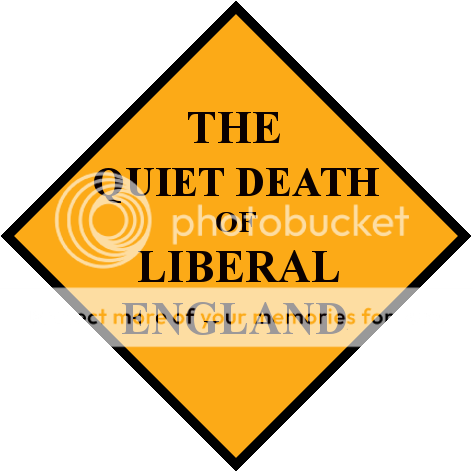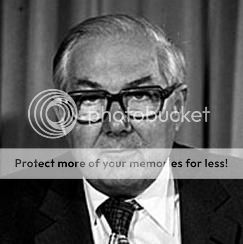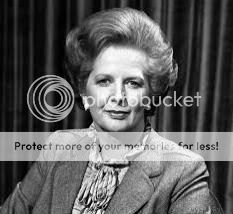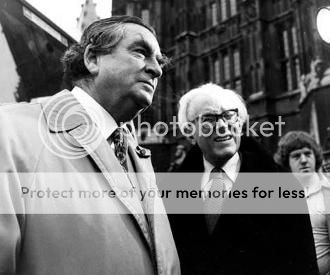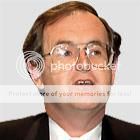The Prime Minister's presumptuousness aside, the next general election had looked for months like delivering a Labour landslide. Whatever memories people had of the winter of '78-79 were more than dwarfed by what had happened since, combined with the ghost of Ted Heath and the three day week. The economic chaos of monetarism followed by a very public u-turn had seen unemployment exceed three million for the first time since the war. Labour were united – at least on the surface – under Healey and his loyal deputy. Whatever indulgent extremes pursued by idealistic local councils, no-one could pin that on the former Chancellor.
The election of 1983 would have delivered a Labour majority – had it not been for an intervention from Buenos Aires. The invasion, and subsequent recapture of the Falkland Islands was an electoral game-changer. For all the failures and upheavals of her term in office, Thatcher succeeded in wrapping herself in the flag. Healey campaigned valiantly. As a war veteran himself, many felt that Healey better encapsulated the public mood better than the triumphalist Thatcher. Campaigning alongside Foot and Shadow Foreign Secretary David Owen, the Labour leader was generally better received than his Tory counterpart. Only the IMF loan and the indulgences of the GLC remained as thorns in his side, endlessly trumpeted by the Conservative-supporting press.
The result, allowing for some regional shifts, was much a copy of four years earlier. Thatcher returned to Downing Street with the same frustratingly-small majority.
Con 334 (42%), Lab 289 (39%), Lib 6 (13%)
With both main parties gaining seats, the only unequivocal losers of the 1983 election were the Liberal Party. After the false hope of a revival in the early '70s, and the taste of power in the Lib-Lab pact of 1977-78, it was a crushing return to obscurity and irrelevance. Expected by many to resign, leader David Steel instead signalled his intention to remain as party leader, even as the party was reduced to its Celtic fringes.
Many analysts have speculated as to whether the Liberals could have achieved greater success in the turbulent political atmosphere of the 1980's. While most accept the inevitability of Britain's gradual return to a two-party system (as typical of most countries with First-Past-The-Past elections), some have drawn parallels with the Liberal's success a decade earlier – when the industrial disputes and strife of the 1970's and the seeming inability of either main party to govern effectively led many voters to understandably seek a “third way”.
Yet despite the superficial comparisons, the political climate of the 1980's had a few subtle differences. The rhetoric of “Thatcherism” and of monetarist ideologues was reigned in by tradional Tory pragmatism. Likewise, while the antics of Tony Benn and Ted Knight made for good copy, those individuals were never anywhere near the real levers of power. Between Thatcher's Tories and Healey's Labour Party, voters had all the choice they wanted; and with the result as close as it looked to be, this was really no time for a “wasted vote”.
Thatcher's second term proceeded as a slightly more harmonious replay of the first. The economy was returning to growth – though everyone disputed the reasons why. Likewise inflation and unemployment were at last falling. Companies like British Aerospace, Britoil and British Telecom were privatised. For the most part these were profitable companies sold to raise revenue. No moves were made however, towards a privatisation of larger utilities like British Steel or British Petroleum. British Coal, the heavily-unionised bane of Ted Heath, naturally remained untouchable.
It was after the disappointment of '83 that the undisputed “leader” of the Labour Left, Tony Benn, made his move. Narrowly re-elected in Bristol South East, the 1983 Labour leadership election seemed to Benn's moment. And yet it wasn't to be. While the Left had captured many CLPs, they still lacked the numbers within the PLP. Healey, while never loved in the same vein as Hardie or Atlee, still had the grudging respect of his colleges. The new electoral college (50% PLP, 25% CLP, and 25% affiliates) split for Healey 54-46. To those familiar only with the tabloid caricature of Tony Benn, it could be expected that this would usher in a new era of infighting, of obstructionism, of ritual blood-letting. But Benn was a loyalist first and foremost. Many had forgotten that he served dutifully as a cabinet minister in the 1960s, when Foot was still a troublesome backbencher. Whatever personal differences he held, and despite his left-ward drift, the Movement came first. As Benn would say immediately after “When the electorate speak everyone should tremble before their decision, and that's certainly the spirit with which I accept the result of this contest.”
So it was that Healey continued his rule on the Opposition benches. Many of the older figures from the 1974-79 period had retired from the shadow cabinet – chief among them Michael Foot who retired to spend more time with his books. Replacing Foot as deputy leader was rising star among the soft left Neil Kinnock. Joining Kinnock in the shadow cabinet were other “bright young things” including Robin Cook and John Prescott.
While Labour lacked total unity, Healey's battles with absolutist union leaders only helped his public image. Further his expulsion from the party of the Troskyite “Militant” group removed a latent line of attack. With the old and “modernising” right of the PLP given their leader's full backing, internal party reforms further marginalised and silenced the vocal Left.
